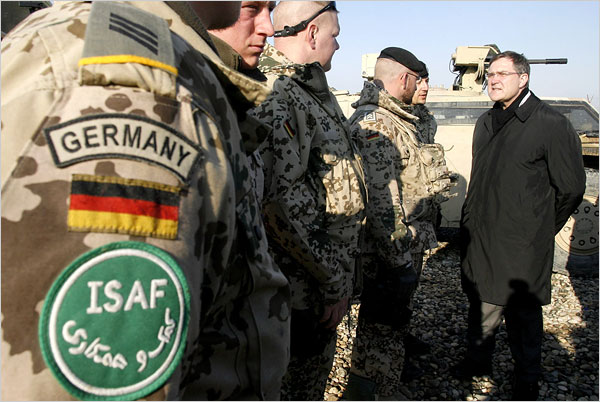
From Nicholas Kulish, New York Times: When Chancellor Angela Merkel hosted a recent reception for military families, she greeted parents, wives and children whose loved ones were spending their holidays in Afghanistan, Lebanon, Kosovo and off the Horn of Africa. German deployments overseas, Ms. Merkel said, “will soon encompass the entire globe.”
On that same wintry afternoon, members of Parliament debated whether to add to the nearly 6,000 German troops currently serving abroad by sending up to 400 soldiers to Turkey, where they would operate two Patriot missile batteries to help protect their NATO ally from a potential escalation of the civil war across the border in Syria.
“For decades, we Germans have benefited from the fact that our partners gave us the feeling of reliable security,” Thomas de Maizière, Germany’s defense minister, said during the debate last month. “Now we are in a position and have the duty, even, to make our impact felt.”
Only a handful of shivering protesters passed out fliers in front of the Brandenburg Gate opposing the deployment. The vote easily passed in the Parliament two days later. . . .
Conscription was suspended indefinitely here in 2011 as part of a drive to professionalize and modernize the armed forces. . . .
“Naturally, a great deal has developed further in terms of the acceptance of deployments outside of this country and outside the NATO territory,” said Col. Ulrich Kirsch, chairman of the German Federal Armed Forces Association, which represents the interests of active and former military personnel. “But the Germans are, now as before, difficult to inspire for military operations.”
Military business is another matter. Germany is the world’s third-biggest arms exporter, behind only the United States and Russia, sending weapons not only to NATO members and allies like Israel but increasingly to the Middle East and beyond. As the business grows, critics at home question sales to undemocratic countries like Saudi Arabia.
Germany’s military industry employs an estimated 80,000 people, jobs Ms. Merkel wants to protect, especially less than a year before September’s parliamentary election. In October, German opposition helped doom the proposed merger of two aerospace giants, British-based BAE Systems and the consortium EADS, in part out of concern that German jobs and influence might be lost in the new entity.
Last month Der Spiegel, the influential newsmagazine, showed a grim-faced Ms. Merkel on the cover in a camouflage suit jacket with the headline “German Weapons for the World.” The magazine described the Merkel doctrine as deploying fewer German troops to conflict zones and instead strengthening partners by selling them arms. The German government approved military exports in excess of 10 billion euros, or over $13 billion, for the first time in 2011, the magazine reported. . . .
In May 2010, Germany’s president, Horst Köhler, gave an interview to German public radio saying that society needed to recognize the sacrifices and contributions of the military. A broader political discussion was necessary, Mr. Köhler said, about the military’s role.
“A country of our size,” Mr. Köhler said, “with its focus on exports and thus reliance on foreign trade, must be aware that military deployments are necessary in an emergency to protect our interests, for example, when it comes to trade routes, for example, when it comes to preventing regional instabilities that could negatively influence our trade, jobs and incomes.”
A public outcry ensued, and Mr. Köhler resigned. But the German Navy was essentially already doing what Mr. Köhler described in his comments, as part of the multinational mission to combat piracy off the coast of Somalia. The government announced plans to suspend conscription just a few months after Mr. Köhler quit. (photo: Fabrizio Bensch/Reuters)
Image: reuters%201%207%2013%20Germany%20Afghanistan.jpg
